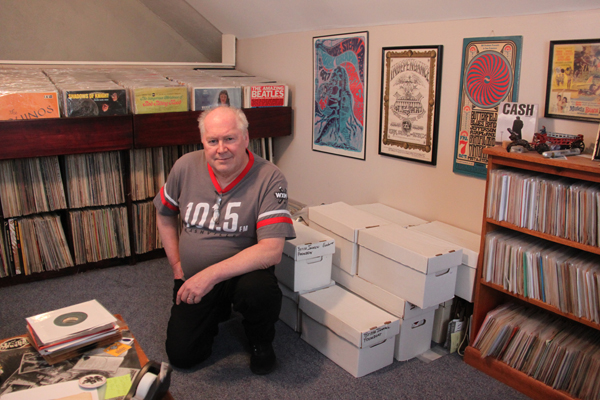
Culture and history are not only determined by what the residents of a community have built or acquired; they can be just as easily defined by what a community throws away—or, similarly, donates to charity. Local thrift shops and flea markets are graveyards of a sort where the magnificent and the mundane lie side by side, their respective value seemingly indistinguishable. Some of these items—say, appliances or electronics—are commodities that have become irrelevant, often due to advancements in technology that have rendered them obsolete.
This is precisely what occurred in the later 1990s and 2000s, when the compact disc replaced vinyl records as the format of choice for listening to music. Both the record and the turntable increasingly found themselves occupying space at thrift shops all over the country, relegated to low-rent status; a nostalgic nod to the archaic and space-consuming way that parents and grandparents listened to music. However unexpectedly, the reemergence of vinyl as the music format of choice among a younger generation has changed that perception. Sales of new vinyl records have soared (yes, they’re pressing new ones, folks), and there is no evidence to support any claim that the trend will be slowing down. Used records, while long available to those who know where to look, have also gained attention and popularity. They’re more available now than ever (though often at higher prices in line with elevated demand).
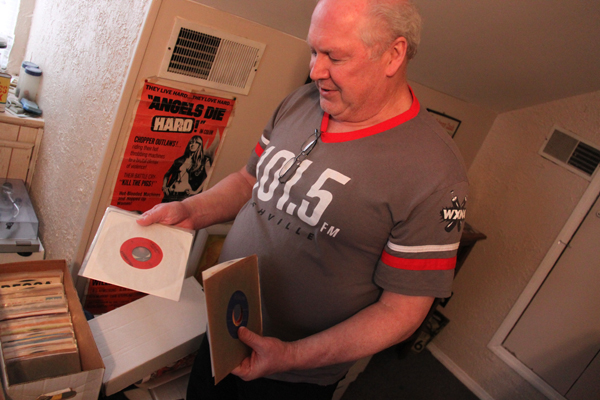
Both the second-hand store and the used record shop are places where discarded personal artifacts from a not-so-distant past end up being re-homed, with no remaining evidence of the hopes and dreams that fueled their creation, or the rush of excitement that accompanied their initial purchase. In the case of music released by major labels for mass consumption—especially the crass kind designed for a quick sale, and typically destined for a short shelf life—this is hardly tragic. But imagine being an undiscovered small-town singer or musician and investing all your energies into putting out a record or two—in small quantities—on a tiny regional label . . . and later finding the fruit of your labor residing in a dusty pile alongside middling, mass-market music from decades past.
Disheartening, to say the least.
Such a find, however, when made by a passionate collector of rare vinyl—someone like me—is a cause for celebration. In a way, it’s also a small-scale resurrection of the excitement felt by the artists who recorded them, not to mention the local fans who cheered them on. It is this possibility of unearthing little-known gems that keeps collectors actively digging through the bins.
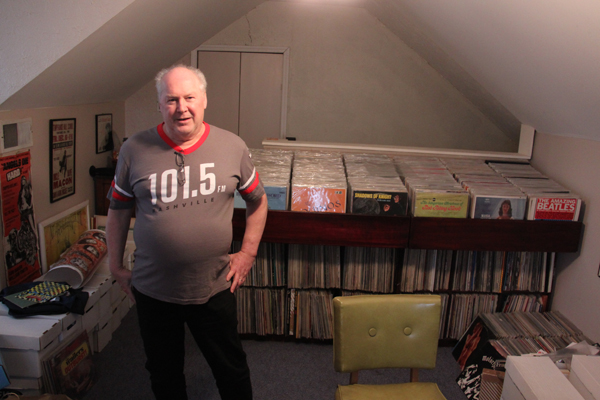
Beginning in the 1960s there was a musical revolution being fought in battles of the bands all across the country by young rock ’n’ roll hopefuls, primarily teens who had been profoundly impacted and influenced by The Beatles’ culture-changing appearances on TV’s Ed Sullivan Show. For the most part, such bands were known only to fans within their own communities. Maybe, if they were lucky, they managed to record a tangible document of their existence to hand out to friends or impress members of the opposite sex. In many instances, these are the only remaining scraps of evidence confirming their existence.
If they were even luckier, a local DJ may have been impressed enough to provide them with some local radio airplay (as in the memorably ecstatic scene from the 1996 movie That Thing You Do). In reality, though, this didn’t happen often. Usually these bands were casualties of the draft, with members being selected for military service. In other cases, they were foiled by their own awareness of their musical limitations and the fear of being exposed when faced with more proficient competition.
A tragic example of a military casualty would be one-time Middle Tennessee resident Larry Herman, a member of The Prophets Combo. The band, which according to all available evidence was likely from Hermitage, had already released its first 45 rpm single prior to Larry coming on board. The band’s second single, “Gertrude” (though misspelled on the record as “Gertrud”), is a flat-out rock ’n’ roll classic and certainly one of the best examples of teen beat/garage-rock to emerge from the Middle Tennessee area. (Incidentally, a mint-condition copy of this hard-to-find single made it into my collection earlier this year after being spotted at Murfreesboro’s own Steered Straight Thrift.) Shortly after the release of this single in June 1967, Mr. Herman was drafted and lost his life in Vietnam.
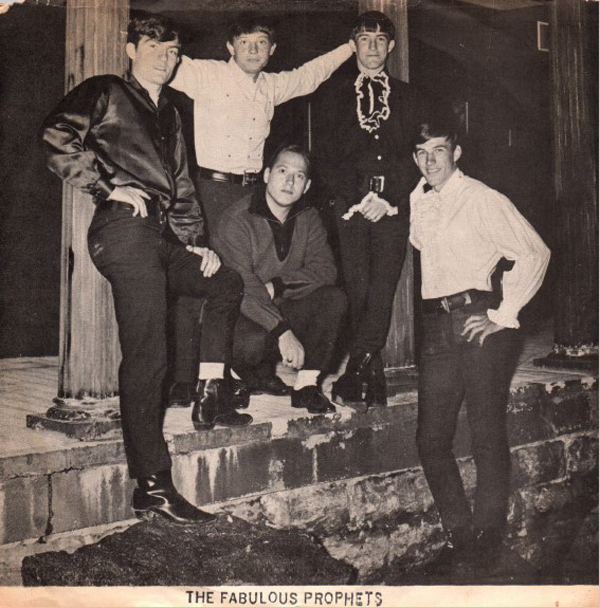
The records many of these bands left behind are textbook examples of youthful exuberance and teen testosterone, their performances rising to levels of energy that their technical ability was unable to match. Such bands are now credited as having laid the groundwork for punk-rock, and are often referred to as garage-punk, owing to the swagger and aggressive delivery their records contained.
No location was immune, and nearly every local scene had its own individual identity, the result of these teens merging their personal social and geographical influences with the sounds they were hearing broadcast through their own hand-held transistors and car radios. The term “garage band” has been coined to collectively represent the incredible outburst of creative energy and the almost simultaneous formation of thousands of teen bands in nearly every community across the United States after witnessing the Beatles’ Big Bang on TV. Middle Tennessee was no exception to this explosion of teen activity, and pretty soon even the Bible Belt was loosening its buckle and grooving to the new sounds of these teenbeat bands.
Given its history as a country music mecca by the mid-20th century, Nashville seems like an unlikely epicenter for a musical explosion of this type to occur. And although there were a handful of teen combos from the immediate area releasing records from Nashville, the truth is that many of these records released on Nashville-based labels were by bands outside of Davidson County, and in some instances not from Tennessee at all. Many would visit Nashville from surrounding states to cut records for tiny labels such as Zap, Valiant, Sur-Speed and Bullet, and bring them home to be distributed as they pleased.
A recent trip to a Bedford County thrift store led to a find that opened up a small part of this musical phenomenon—a single released on Nashville-based Varsity Records by a Shelbyville combo called The Vicars, formed from the remnants of a popular local Ventures-influenced instrumental band, The Fabulous Playboys. This single, “Love Has a Way,” released in December of 1965, is an aggressive, crude recording driven by a wild organ and snotty vocals, with a pair of frantic guitar solos that propel the song totally out of control.
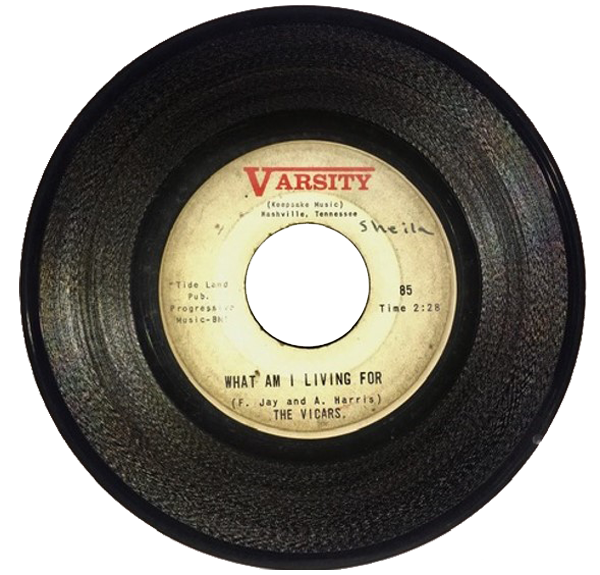
These types of unpolished performances were unlikely to be committed to tape in the pristine studio environments of Nashville, and thus a legion of tiny independent labels emerged across the state to handle these “vanity” pressings of usually 500 to 1,000 records. The Champ label alternated its offices between Nashville and Johnson City and was home to East Tennessee’s The Checkmates as well as a band who, in 1960s-era Middle Tennessee, had the audacity to release two extremely scarce singles as Thee Saints and the Prince of Darkness. Wonder how that name went over at the local VFW or high school dances? Both bands were from the Tri-City area and somehow found their way to Middle Tennessee for their recording opportunities.
The Tangle, comprised of teenagers from Camden, Tennessee, released its audacious single “Our Side of Town” on the Canary Record label. This sneering and taunting 45, boasting sexual innuendo and Rolling Stones swagger, was more than likely not going to receive airplay in the band’s hometown and remains one of the most sought-after records from the area.
All roads lead to The Kapers actually being from East Nashville, and with no success locating any member of this band it can only be imagined how this group of presumably teenagers saw fit to record and release a single in 1964 pairing an outrageous cover of shock-rock innovator Screamin’ Jay Hawkins’ “Alligator Wine” with the band’s very own, gleefully raunchy composition “Topless” on the local J.E.D. International record label. Among other Nashville groups were The Coming Generation, The Chessmen, The Glass Threads and The Emergency Exit.
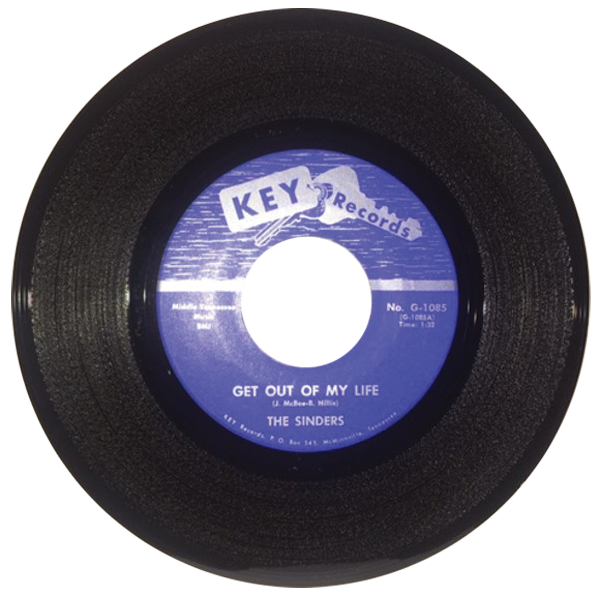
Many other bands from Middle Tennessee found it far easier to rent studio time closer to home. The Sinders released one amazing single, “Get Out of My Life,” on the McMinnville-based Key label, while Waynesboro’s The Ravenz left us with the astonishing garage-punk single “Just Like I Want Her” on Crockett Records (no doubt a tip of the hat to native son Davy!). Rounding out the region were The Missing Lynx from Lawrenceburg, The Madhatters from Livingston, The Mid-Knight-Ere from the Crossville area and The Jacks Wild from Cookeville, all represented on shiny black vinyl 45s.
The Uncalled For, hailing from the Manchester area, ultimately found redemption by being asked to represent their hometown at the Bonnaroo Festival in 2011. In 1967, the band had put Manchester on the map after its single on the local Dollie label, “Do Like Me,” was picked up for national distribution by Laurie Records. It is now recognized as a classic of the genre and is sought after by collectors all over the world.
This brings us back to the thrift stores and antique shops. Over the years, many of these records have found their final resting place in the very communities where these teen bands once enjoyed local success. These records were given to family members, girlfriends and boyfriends, and sold to fans as souvenirs. The remainders, if any, languished in basements and closets until they were either rediscovered or simply discarded as remnants of time and place no longer considered valuable in either personal or historical terms. Personal value may be subjective, but historical value and significance clearly exist regarding this overlooked period of American music. Singularly these bands may seem insignificant, but collectively they represent something much greater, being historically significant to the communities from which they emerged. The priceless, nearly lost history of American garage bands is one sure gauge for separating the vinyl treasure from the trash.













